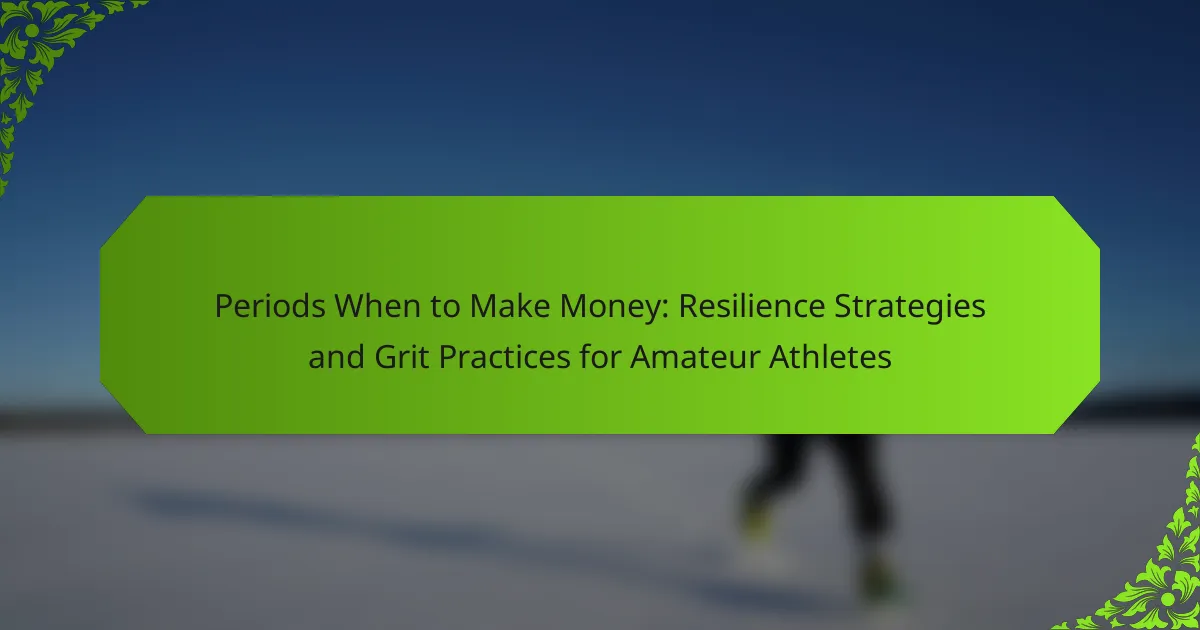Building resilience and grit is essential for amateur athletes facing challenges in sports. This article explores the role of mental toughness, supportive environments, and consistent practice in developing these attributes. We will discuss goal-setting, the importance of a positive mindset, and the value of mentorship. Additionally, we will examine how moral dilemmas contribute to character building and adaptability in sports.

What are the foundational principles of resilience and grit in amateur sports?
Resilience and grit in amateur sports are built through consistent practice, mental toughness, and a supportive environment. These principles enable athletes to overcome challenges and setbacks effectively.
Mental toughness is a unique attribute that allows athletes to maintain focus and determination during difficult times. It involves developing a positive mindset and learning to manage stress effectively.
Supportive environments, such as coaching and community, play a crucial role in fostering resilience. Athletes who receive encouragement are more likely to persevere through adversity.
Consistent practice is a root attribute essential for developing grit. Regular training helps athletes build confidence and skills, reinforcing their ability to face challenges head-on.
How do resilience and grit influence athletic performance?
Resilience and grit significantly enhance athletic performance by fostering mental toughness and perseverance. These traits enable athletes to overcome challenges, maintain focus, and push through adversity. Research shows that athletes with high levels of resilience and grit tend to achieve better outcomes in competitive environments. For instance, a study found that grit can predict success in sports, as it correlates with sustained effort and long-term commitment to training. Developing these qualities empowers amateur athletes to improve their performance and reach their goals.
What are common challenges amateur athletes face in developing these traits?
Amateur athletes commonly face challenges such as limited access to resources, inconsistent training environments, and mental pressure. These factors can hinder the development of resilience and grit.
Limited coaching support affects skill development and emotional guidance. Inconsistent training schedules disrupt progress and commitment. Mental pressure from competition can lead to anxiety, impacting performance.
Additionally, balancing sports with other life responsibilities creates stress, making it difficult to maintain focus on athletic goals. These challenges require strategic approaches to overcome and build essential traits.

What universal practices can enhance resilience and grit?
Practices that enhance resilience and grit include setting clear goals, maintaining a positive mindset, and fostering a supportive community. These strategies help amateur athletes navigate challenges effectively.
Goal-setting provides a clear direction, while a positive mindset encourages perseverance through setbacks. A supportive community offers motivation and accountability, essential for building mental toughness.
Incorporating mindfulness techniques can further enhance focus and emotional regulation, critical for maintaining resilience in sports. Regular reflection on experiences also aids in developing a growth mindset, reinforcing the ability to adapt and overcome obstacles.
Which mental strategies are effective for building resilience?
Effective mental strategies for building resilience in amateur athletes include positive self-talk, visualization, goal setting, and mindfulness. These strategies enhance mental toughness and adaptability during challenges. Positive self-talk fosters a constructive mindset, while visualization helps athletes mentally rehearse success. Goal setting provides clear objectives, and mindfulness promotes focus and stress management. Integrating these techniques can significantly improve performance and perseverance in sports.
How can visualization techniques improve mental toughness?
Visualization techniques enhance mental toughness by fostering focus, confidence, and resilience in amateur athletes. These techniques allow athletes to mentally rehearse scenarios, preparing them for high-pressure situations. As a result, they develop a stronger mental framework to cope with challenges. Research indicates that consistent visualization practice can significantly improve performance metrics, highlighting its role in building grit.
What role does positive self-talk play in grit development?
Positive self-talk significantly enhances grit development by fostering resilience in amateur athletes. It helps them maintain motivation during challenging training sessions and competitions. By reinforcing a positive mindset, athletes can overcome obstacles and setbacks more effectively. Research indicates that athletes who engage in constructive self-dialogue show improved performance and persistence. This unique attribute of positive self-talk is crucial for building long-term grit, enabling athletes to push through adversity and achieve their goals.
What physical training methods support resilience?
Physical training methods that support resilience include strength training, endurance training, and high-intensity interval training (HIIT). These methods enhance physical capacity, mental toughness, and adaptability. Strength training builds muscle and bone density, promoting confidence. Endurance training improves stamina, enabling athletes to push through challenging situations. HIIT combines short bursts of intense activity with rest, fostering grit and perseverance. Incorporating these methods into training regimens develops a holistic approach to resilience for amateur athletes.
How does cross-training build physical and mental endurance?
Cross-training enhances both physical and mental endurance by diversifying workout routines. This approach builds resilience through varied challenges, preventing burnout and injury. Incorporating different activities fosters grit, as athletes adapt to new demands. Research indicates that athletes who cross-train experience improved overall performance and mental toughness. By engaging in multiple disciplines, amateur athletes develop a robust foundation for long-term success.
What are the benefits of regular goal-setting?
Regular goal-setting enhances focus, motivation, and resilience in amateur athletes. It fosters a sense of purpose, guiding athletes through challenges. By setting measurable objectives, athletes can track progress, boosting confidence. Furthermore, it cultivates grit, essential for overcoming setbacks. Regularly revisiting goals allows for adjustments, ensuring alignment with evolving aspirations.

What unique approaches can amateur athletes take to foster these qualities?
Amateur athletes can foster resilience and grit through unique approaches such as embracing failure, setting incremental goals, and seeking mentorship. Embracing failure teaches valuable lessons, while incremental goals provide achievable milestones that build confidence. Mentorship offers guidance and support, enhancing personal growth. These strategies cultivate a mindset focused on persistence and adaptability, essential for overcoming challenges in sports.
How can mentorship influence resilience in young athletes?
Mentorship significantly enhances resilience in young athletes by providing guidance and emotional support. Mentors help athletes navigate challenges, fostering a growth mindset essential for overcoming adversity. This relationship builds grit, as athletes learn to persist through setbacks. Research shows that athletes with mentors report higher levels of self-efficacy and emotional regulation, crucial for resilience. Furthermore, mentorship cultivates a positive environment, reducing stress and enhancing performance, ultimately leading to long-term success in sports.
What role does team dynamics play in building grit?
Team dynamics significantly enhance the development of grit among amateur athletes. Positive interactions and mutual support foster resilience, enabling athletes to persevere through challenges. Collective experiences, such as overcoming setbacks together, build a shared sense of determination. Effective communication within a team can also reinforce individual commitment, promoting accountability and motivation. As a result, athletes develop not only personal grit but also a cohesive team identity that amplifies their collective resilience.

What are the rare but impactful practices for cultivating resilience and grit?
Practices for cultivating resilience and grit in amateur athletes include fostering a growth mindset, setting specific goals, and embracing challenges. Engaging in reflective practices enhances self-awareness, while building a supportive community provides encouragement. Rarely, incorporating mindfulness techniques can significantly improve focus and stress management.
How can failure be reframed as a learning opportunity?
Failure can be reframed as a learning opportunity by viewing setbacks as essential for growth. This perspective fosters resilience and grit in amateur athletes. Embracing failure allows athletes to analyze their mistakes, understand their weaknesses, and develop strategies for improvement. For example, athletes who reflect on their performance can identify specific areas to enhance, turning negative experiences into valuable lessons. This process not only builds character but also enhances overall performance in future competitions.
What unconventional methods have proven effective for grit development?
Unconventional methods such as mindfulness training, storytelling, and community service have effectively fostered grit in amateur athletes. Mindfulness enhances focus and emotional regulation, while storytelling builds personal narratives of resilience. Community service cultivates empathy and social connections, reinforcing perseverance in sports.

How do moral dilemmas in sports impact resilience and grit?
Moral dilemmas in sports significantly enhance resilience and grit in amateur athletes. Facing ethical challenges cultivates problem-solving skills and mental toughness. Athletes learn to navigate complex situations, fostering perseverance and adaptability. These experiences build character, enabling them to overcome future adversities effectively.
What ethical challenges do amateur athletes face?
Amateur athletes face significant ethical challenges, including pressure to perform, issues of fairness, and the temptation to use performance-enhancing substances. These dilemmas can undermine their integrity and mental health. The pressure to win can lead to compromised values, while the lack of regulation in amateur sports creates an environment where unethical practices may flourish. Building resilience and grit is essential for navigating these moral questions. Athletes can benefit from support systems that promote ethical decision-making and mental well-being.
How can navigating moral questions strengthen an athlete’s character?
Navigating moral questions strengthens an athlete’s character by fostering resilience and grit. Athletes face dilemmas that challenge their values, encouraging personal growth. This process cultivates decision-making skills and enhances mental toughness. Engaging with ethical issues builds integrity, which is crucial for long-term success in sports. As a result, athletes develop a deeper understanding of themselves and their principles, leading to greater perseverance in competitive environments.

What best practices should amateur athletes adopt for immediate improvement?
Amateur athletes should adopt mental resilience techniques and consistent training routines for immediate improvement. Building grit involves setting specific goals, embracing challenges, and maintaining a positive mindset. Regular reflection on performance and learning from setbacks enhances resilience. Engaging in supportive communities fosters motivation and accountability, while diverse training methods prevent burnout.
What are the common mistakes to avoid in resilience training?
Common mistakes in resilience training include neglecting individual differences, overemphasizing mental toughness, and failing to set realistic goals. Amateur athletes often overlook the importance of emotional awareness and support systems. Additionally, inconsistent practice and inadequate feedback hinder progress. Understanding these pitfalls can enhance resilience development effectively.
What expert insights can guide athletes in their journey?
Building resilience and grit is essential for amateur athletes. Expert insights emphasize the importance of mental toughness, goal setting, and maintaining a positive mindset.
1. Cultivate mental resilience through visualization techniques and mindfulness practices.
2. Set specific, measurable goals to track progress and maintain motivation.
3. Embrace setbacks as learning opportunities, fostering a growth mindset.
4. Surround yourself with supportive peers and mentors to enhance motivation and accountability.
These strategies help athletes navigate challenges and enhance performance.


